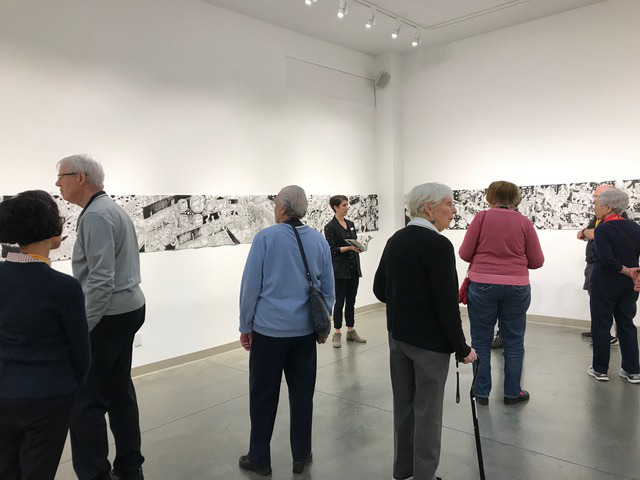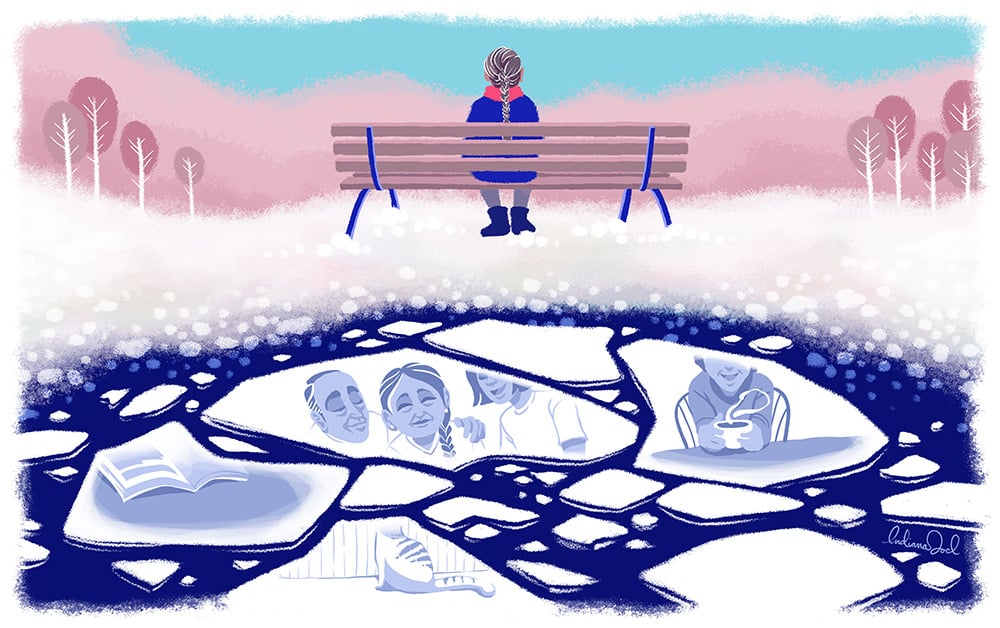Parkgate Community Centre in North Vancouver is like countless others: it offers fitness programs, family services, and activities for toddlers, children, youth, and seniors. But it also offers an unusual and very successful program for families dealing with dementia. “My Parkgate BREAK” appears to be unique on the North Shore and perhaps elsewhere in B.C.
My Parkgate BREAK began in 2013, when Erin Smith, seniors’ services manager, was involved in a grassroots project with seniors after caring for her grandmother, who had vascular dementia. Shortly after she passed away, her father was diagnosed. In an interview with The Tyee, Smith described the challenge of a “sandwich generation” mom: bringing up kids, looking after her grandmother, and trying to hold down a job. She realized that if she needed a break, so did a lot of other people — not only the caregivers, but also the cared-for. Both feel painfully isolated, which in itself can cause depression.
Researching the idea, Smith found the demand was certainly there. The North Shore’s seniors are 17.5 per cent of the population. Their numbers are expected to double by 2031, and dementia affects 7.1 per cent of the North Shore population. Those who care for them must be a much higher percentage of the population, but they have surprisingly few resources apart from other friends and relatives.
This is especially true of families dealing with early to moderate dementia, with loved ones who can still get through the day, dress themselves, and take their medications. When more help is needed, such families find themselves on waitlists for government-subsidized services. Government services may not always include adequate support activities. There is also a dearth of low-cost programs for this group of people living with dementia.
Smith explored the idea of a “respite” program that would offer caregivers a few hours a week when they could deal with other demands while their loved ones were safe, active, and engaged with other people. She realized the program needed volunteer workers and private support to offer a program for a reasonable cost. As well, plenty of space for activities was needed, and so a community centre was a great locale.
Working with other community agencies including Vancouver Coastal Health, Lionsview Seniors’ Planning Society and the Alzheimer Society, Smith worked to create a local, sustainable program that could run with mostly volunteer labour. It wouldn’t try to be an “adult daycare,” which can be very expensive, but it would offer five hours, twice a week, of varied social activities: walks, bus tours, arts, sports, and a good meal in company with others.
With funding largely provided through the Deep Cove Lions, My Parkgate BREAK launched as a pilot program to test the concept. It soon went from six participants to 12, with a growing staff of volunteers. Late in 2018, Pam Havens took over as supervisor. Havens was among the first graduates of Simon Fraser’s Gerontology Diploma program and was support and education coordinator of the Alzheimer Society of B.C. and later provided geropsychiatric education for Vancouver Coastal Health and Fraser Health.
My Parkgate BREAK’s participants meet Tuesdays and Thursdays and take part in conversation, singing, art, sports like badminton and table tennis, brain and body fitness, and short bus trips. In good weather they may walk to a nearby community garden, or hang out with the preschoolers (the affection is mutual). Events like birthdays are occasions for cake and congratulations. They share a good lunch and coffee. The atmosphere is upbeat, with participants and volunteers sharing jokes and trading compliments.

Both Smith and Havens told The Tyee: “They’re in a community.” Rather than be isolated at home or in an adult day care, they interact with almost everyone passing through Parkgate, from the young moms and dads with toddlers to the chess and cribbage players to the staff of North Vancouver Rec.
The My Parkgate BREAK program, or programs like it, would not run without the many trained and dedicated volunteers or without more substantial long-term funding. Since the program’s inception in 2014 until April 2019, Smith said, volunteers have given more than 10,500 hours of service. Many of these volunteers have themselves been caregivers of people living with dementia, and they are extremely committed to providing our members with some moments of joy, laughter, stimulation and community.
“We want to be a club where our members and their families feel welcomed and respected,” says Havens.
The success of the My Parkgate BREAK program has triggered interest across the North Shore, and Havens is now working to develop a similar program for a new community centre scheduled to be built near Lions Gate Bridge. Neither she nor Smith considers the My Parkgate BREAK a solution to all the stress associated with dementia, but they both believe the program does make a difference to the quality of life of the members and families who participate.
“This is a difficult journey that no one should travel alone,” Havens said. The My Parkgate BREAK program gives participants and their caregivers a few hours’ respite from one another on that journey, some stimulus, and a lot of laughter. Participation may alleviate the depression and social isolation that often co-occur with dementia, and may even postpone the almost inevitable move to a care facility, which is extremely difficult for both the person living with dementia and for the family.
Dementia is a story with no happy endings. But sometimes we can die without being utterly defeated, and we can win some skirmishes on our fighting retreat. The staff and volunteers of the My Parkgate BREAK win a lot of those skirmishes. ![]()

















Tyee Commenting Guidelines
Comments that violate guidelines risk being deleted, and violations may result in a temporary or permanent user ban. Maintain the spirit of good conversation to stay in the discussion.
*Please note The Tyee is not a forum for spreading misinformation about COVID-19, denying its existence or minimizing its risk to public health.
Do:
Do not: